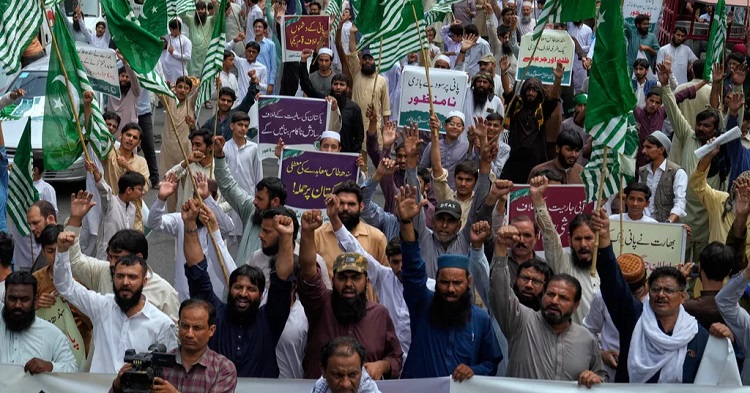India blames Pakistan for Kashmir attack, suspends historic water treaty


Tensions between India and Pakistan escalated sharply on Thursday after a deadly attack in Kashmir killed 26 people, prompting New Delhi to launch a diplomatic offensive against Islamabad and suspend a landmark water-sharing treaty that had withstood wars and border skirmishes for over six decades.
India accused Pakistan of backing the assault in Kashmir’s tourist town Pahalgam, which shattered claims of calm in the disputed region and fuelled demands for a strong response from Prime Minister Narendra Modi’s government.
India’s Foreign Secretary Vikram Misri announced late Wednesday that several Pakistani diplomats were asked to leave the country.
In a statement issued Thursday, India's foreign ministry said all visas issued to Pakistani nationals will be revoked with effect from Sunday. It also advised Indians citizens not to travel to Pakistan, reports AP.
In a reciprocal move, Indian diplomats are being withdrawn from Pakistan.
Both countries agreed to cut diplomatic staff from 55 to 30, effective May 1, and the only functioning land border crossing between the nations will be closed.
Besides, Indian Prime Minister Modi vowed harsh action, “India will identify, track and punish every terrorist, their handlers and their backers. We will pursue them to the ends of the earth,” he declared in a public rally on Thursday.
“We will pursue them to the ends of the earth,” said Modi, who was later in the day scheduled to head an all-party meeting with opposition parties to brief them on the government’s response to the attack.
Meanwhile, Pakistan rejected the accusations and called India’s actions rash and baseless.
Pakistan Prime Minister Shehbaz Sharif convened a meeting of the country’s National Security Committee to chart out a response to India’s diplomatic and strategic retaliation.
According to Radio Pakistan, the top civil and military leadership are attending the emergency meeting, reviewing measures in response to “India’s hastily taken, impulsive and impractical water measures.”
One of India’s most significant moves was the suspension of the 1960 Indus Waters Treaty (IWT), brokered by the World Bank, which had survived major Indo-Pak conflicts in 1965, 1971, and during the Kargil skirmishes in 1999.
The IWT governs the sharing of waters from the Indus River system. It allocates the three eastern rivers — Ravi, Beas, and Sutlej — to India, and the three western rivers — Indus, Jhelum, and Chenab — to Pakistan, while allowing India limited non-consumptive use of the western rivers, such as for hydropower projects.
Despite decades of political hostility, the treaty had stood as a rare example of cooperation, managed by a joint Permanent Indus Commission responsible for monitoring and resolving disputes, according to BBC.
Pakistan’s Foreign Minister Ishaq Dar condemned India’s actions, telling Dunya News TV, “India has taken irresponsible steps and levelled allegations.”
He added that “any kinetic step by India will see a tit-to-tat kinetic response” from Pakistan, rekindling memories of February 2019 when a car suicide bombing in Kashmir brought the two countries to the verge of war.
Earlier in August 2019, Modi overturned the status quo in Kashmir when his government revoked the region’s semi-autonomous status and brought it under direct federal control.
That move significantly increased tensions with Pakistan, though a 2021 renewed ceasefire agreement had helped stabilise the Line of Control, which has largely held despite attacks on Indian forces by insurgents in Kashmir.
The latest attack has particularly alarmed residents in Kashmir, as militants rarely target tourists. The violence prompted shutdowns of private schools, markets, and businesses on Wednesday, fuelling concerns over potential economic fallout in a region heavily reliant on tourism.
Protests erupted across cities in Pakistan, including Islamabad, where demonstrators demanded the government retaliate against India’s decision to suspend the treaty.
